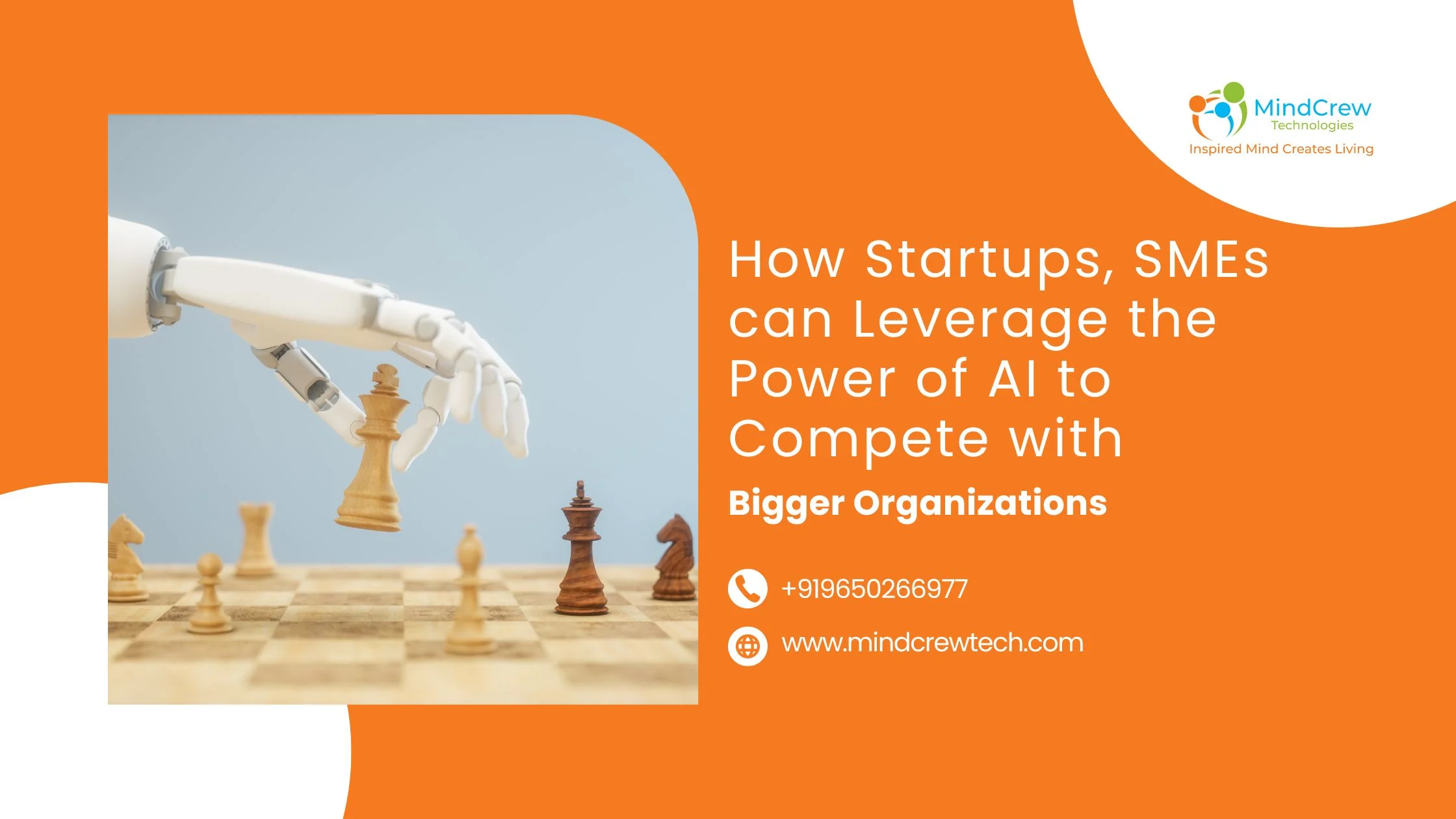This is How Startups, SMEs can Leverage the Power of AI to Compete with Bigger Organizations
Are you a startup or small to medium-sized enterprise (SME) struggling to keep up with the giants in your industry? Well, fret no more! The game-changing power of artificial intelligence (AI) is here to level the playing field and catapult your business into new realms of success. In this blog post, we will explore how startups and SMEs can harness the incredible potential of AI to not only compete but thrive alongside bigger organizations. Get ready for a mind-blowing journey that might just redefine everything you thought was possible for your business!
Introduction to AI and its applications in business
In today’s fast-paced business world, companies are constantly looking for ways to gain a competitive edge. One technology that has emerged as a game-changer for businesses is Artificial Intelligence (AI). Once thought of as science fiction, AI has now become a reality and is being integrated into various industries, including the business sector.
So what exactly is AI? In simple terms, AI refers to computer systems that can perform tasks that usually require human intelligence. These tasks include learning, problem-solving, decision making, and even visual perception. With the advancements in machine learning algorithms and real-time data processing capabilities, AI has become more powerful than ever before.
Nowadays, businesses of all sizes are leveraging the power of AI to improve their operations and stay ahead of the competition. Startups and small-to-medium enterprises (SMEs) may feel like they cannot compete with bigger organizations due to limited resources. However, by incorporating AI into their processes, these smaller companies can level the playing field.
Benefits of AI for startups and SMEs
Artificial Intelligence (AI) has been a game changer for businesses of all sizes, but it is especially beneficial for startups and small to medium enterprises (SMEs). In today’s competitive market, these smaller organizations often struggle to keep up with the resources and technological advancements of larger companies. However, with the use of AI, startups and SMEs can level the playing field and compete with bigger organizations. Here are some of the key benefits that AI offers to startups and SMEs:
1. Increased Efficiency:
One of the biggest challenges for startups and SMEs is limited resources, including time and manpower. With AI, these organizations can automate various tasks such as data entry, customer service inquiries, inventory management, and more. This allows them to save time, reduce human error, and focus on other important aspects of their business.
2. Cost Savings:
Implementing AI technology may seem like a costly investment at first glance; however, in the long run it can actually save businesses money. By automating tasks that would otherwise require hiring additional staff or outsourcing services, AI helps reduce operational costs for startups and SMEs.
3. Improved Customer Experience:
Customer satisfaction is crucial for any business to succeed. With AI-powered chatbots and virtual assistants available 24/7, startups and SMEs can provide efficient customer support without having to hire a large team or invest in expensive call centers. This not only saves costs but also improves the overall customer experience by providing quick responses.
4. Better Decision Making
Artificial intelligence (AI) has become a buzzword in the world of business, and for good reason. In today’s fast-paced and highly competitive market, businesses of all sizes are constantly looking for ways to innovate, streamline processes, and stay ahead of their competitors. This is where AI comes in – it offers startups and SMEs a powerful tool to level the playing field against bigger organizations.
Here are some key benefits that AI can bring to startups and SMEs:
1. Cost-Effective Solutions:
One of the biggest challenges faced by startups and SMEs is limited resources. Implementing traditional technologies or hiring specialized staff can be costly, making it difficult for smaller businesses to compete with larger ones. However, AI offers cost-effective solutions that can perform tasks at a fraction of the cost compared to human labor. For instance, chatbots can handle customer inquiries 24/7 without needing breaks or salaries.
2. Enhanced Efficiency:
Time is money for any business, especially for startups and SMEs where every minute counts towards growth and success. By automating routine tasks such as data entry or email management, AI frees up valuable time for entrepreneurs to focus on more important aspects of their business such as strategy development or building relationships with customers.
3. Personalization:
With access to vast amounts of data, AI technology can analyze consumer behavior patterns and provide personalized recommendations or experiences based on their preferences. This level of personalization not only improves customer satisfaction but also helps smaller businesses build strong brand loyalty – something
Case studies of successful implementation of AI in small businesses
Case studies of successful implementation of AI in small businesses have shown that incorporating artificial intelligence technology can greatly benefit these companies and give them a competitive edge against bigger organizations. Here are some examples of how small businesses have successfully implemented AI to improve their operations, customer experience, and overall growth.
1. Chatbots for Improved Customer Service:
Many small businesses struggle with providing round-the-clock customer service due to limited resources. However, chatbots powered by AI have proven to be an effective solution for this problem. One such example is the case of beauty brand Sephora, which implemented an AI-powered chatbot on their messaging app to help customers find products and answer their queries. This not only improved the response time but also enhanced the overall customer experience.
2. Personalized Recommendations:
AI algorithms can analyze customer data and behavior to provide personalized recommendations, similar to those used by e-commerce giant Amazon. Small businesses can also leverage this technology to offer tailored product or service suggestions based on a customer’s past purchases or browsing history. For instance, boutique fitness studio Barre3 used AI-based software to create personalized workout plans for its clients, resulting in increased engagement and client retention.
3. Streamlined Operations:
Small businesses often face challenges in managing their day-to-day operations efficiently due to limited resources and manpower. By implementing AI technology like machine learning and automation tools, these tasks can be streamlined, allowing employees to focus on more value-added activities. A notable example is the use of automated inventory management systems by fashion retailer Stitch Fix, which helped them reduce inventory errors and save time on manual inventory checks.
4. Predictive Analytics:
AI-powered predictive analytics can help small businesses make data-driven decisions and anticipate future trends. For instance, online retailer Etsy used AI-based algorithms to analyze customer data and predict which products would sell well during the holiday season. This allowed them to stock up on popular items beforehand, resulting in increased sales and reduced stock-outs.
5. Fraud Detection:
Small businesses are often vulnerable to frauds and scams, making it essential for them to have effective detection systems in place. AI technology can be used to analyze transaction data and identify suspicious activities in real-time, reducing the risk of fraud. A case in point is the use of AI-based fraud detection software by financial services company Kabbage, which helped them save millions of dollars by identifying fraudulent loan applications.
Challenges faced by startups and SMEs in adopting AI
Artificial Intelligence (AI) has become a hot topic in the business world, with major companies investing heavily in this technology to gain a competitive edge. However, for startups and small and medium-sized enterprises (SMEs), adopting AI can be a daunting task. While AI has the potential to revolutionize their operations and drive growth, there are several challenges that these businesses face when it comes to implementing this technology.
In this section, we will explore some of the key challenges faced by startups and SMEs in adopting AI and provide insights on how they can overcome them.
1. Lack of Resources:
One of the main barriers for startups and SMEs in adopting AI is the lack of resources. Unlike large organizations with significant budgets, smaller businesses often have limited funds and may not be able to afford expensive AI technologies or hire specialized professionals to develop and implement them.
To overcome this challenge, startups and SMEs can consider using open-source AI tools or cloud-based services that offer affordable pricing options. They could also collaborate with universities or research institutions that may be willing to provide access to their cutting-edge AI technologies at a lower cost.
2. Limited Data Access:
AI algorithms require vast amounts of data to train models effectively. However, many startups and SMEs may not have access to large datasets due to limited customer base or niche markets. This can hinder their ability to develop accurate predictive models.
To address this challenge, businesses can leverage partnerships with other organizations or data vendors who specialize in collecting and analyzing data. They could also explore alternative data sources, such as social media or web analytics, to supplement their own data and improve the accuracy of their AI models.
3. Resistance to Change:
Adopting AI often requires a significant shift in business processes and operations, which can be met with resistance from employees who are accustomed to traditional methods. This can lead to a lack of buy-in from the workforce and hinder the successful implementation of AI.
To overcome this challenge, businesses should involve employees in the decision-making process and provide them with adequate training on how to use AI tools. It is also crucial for business leaders to communicate the benefits of AI and how it can enhance their daily tasks, rather than replace them.
4. Integration with Existing Systems:
Many startups and SMEs may already have existing systems and processes in place that are not compatible with AI technologies. Integrating these new tools can be a complex task, requiring significant time and effort.
To address this issue, businesses should carefully assess their current systems and identify areas where they can integrate AI seamlessly. They could also seek assistance from third-party vendors who specialize in integrating AI solutions with existing systems.
How to overcome these challenges and start implementing AI
Implementing AI can bring numerous benefits to any organization, regardless of its size. However, for startups and small to medium-sized enterprises (SMEs), there may be several challenges that they face in adopting this technology. These challenges could range from limited resources and technical expertise to concerns about the cost and ROI of implementing AI.
But with the right approach, these challenges can be overcome, and SMEs can start leveraging the power of AI to compete with bigger organizations. Here are some steps that startups and SMEs can follow to successfully implement AI:
1. Clearly Define Your Objectives:
Before embarking on an AI implementation journey, it is essential for startups and SMEs to have a clear understanding of their business goals. They should identify specific areas where they believe AI can bring significant improvements or efficiencies. This could include automating repetitive tasks, enhancing customer experiences, or optimizing processes. Having a clear objective will help streamline the implementation process and ensure that resources are used effectively.
2. Identify Potential Use Cases:
Once the objectives are defined, the next step is to identify potential use cases for AI within your organization. This requires conducting a thorough assessment of your existing processes and identifying areas where AI can add value. Startups and SMEs should focus on low-hanging fruits – use cases that are easier to implement yet provide tangible benefits.
3. Leverage Existing Infrastructure:
One common misconception among startups and SMEs is that implementing AI requires expensive infrastructure upgrades or investments in high-end hardware. While advanced systems can certainly provide better performance, AI can also be implemented using existing infrastructure. Cloud-based AI solutions, for instance, offer a cost-effective way to leverage AI capabilities without the need for significant investments in hardware or software.
4. Collaborate with AI Experts:
Implementing AI can be a complex process, and it is not something that organizations should attempt to do on their own. SMEs and startups should consider collaborating with AI experts – either by hiring in-house talent or partnering with external vendors. These experts can help with the evaluation of use cases, choosing the right tools and technologies, and providing support throughout the implementation process.
5. Focus on Data Quality:
AI algorithms require large volumes of high-quality data to function accurately. However, many startups and SMEs struggle with data quality issues due to limited resources or inadequate processes for data management. Before implementing AI, it is crucial to ensure that your data is clean, organized, and accessible. This might require investing in data management tools or establishing proper processes for collecting and storing data.
Tools and resources available for startups and SMEs to leverage AI
As technology continues to advance at an unprecedented pace, it has become increasingly important for startups and SMEs (Small and Medium Enterprises) to stay ahead of the curve in order to compete with larger organizations. Artificial Intelligence (AI) is one such technology that has gained significant momentum in recent years, offering a wide range of tools and resources for businesses of all sizes. In this section, we will explore some of the key tools and resources available for startups and SMEs to leverage AI.
1. AI-Powered Business Solutions:
One of the most powerful ways for startups and SMEs to utilize AI is through utilizing AI-powered business solutions. These solutions use machine learning algorithms to automate various processes within a business, saving time and increasing efficiency. For example, sales forecasting software can help businesses predict customer demand based on historical data, while chatbots can handle customer inquiries 24/7 without the need for human intervention.
2. Cloud-based AI Services:
Cloud-based services have made it easier than ever for businesses to access advanced technologies like AI without requiring a large upfront investment in hardware or expertise. Many cloud service providers offer pre-built libraries and APIs that allow even non-technical users to incorporate AI into their products or services.
3. Online Training Platforms:
With the growing demand for artificial intelligence skills, there are now numerous online platforms that offer courses specifically designed for individuals without a technical background. These training platforms provide an accessible way for entrepreneurs and small business owners to learn about AI applications relevant to their industry.
4 . AI-Powered Marketing Tools:
AI-powered marketing tools can help businesses gather and analyze large amounts of customer data to create more targeted and personalized marketing campaigns. These tools can also automate tasks such as email marketing, social media management, and content creation, allowing businesses to reach a wider audience with less effort.
5. Open-source AI Libraries:
For businesses with the resources and expertise to develop their own AI solutions, open-source libraries provide a cost-effective way to access state-of-the-art machine learning algorithms. These libraries are continuously updated by a community of developers and researchers, making them an invaluable resource for startups and SMEs looking to innovate with AI.
6. Government Support Programs:
Many governments around the world have recognized the potential of AI in driving economic growth and have launched support programs specifically aimed at helping startups and SMEs adopt and integrate AI into their operations. These programs offer funding, training, and networking opportunities for businesses looking to leverage AI.
Future predictions for the role of AI in small business growth
Future predictions for the role of AI in small business growth are becoming more and more exciting as technology continues to advance at a rapid pace. In fact, experts predict that by 2025, the global market for AI will reach over $190 billion, with small businesses representing a significant portion of this growth.
One of the most significant ways that AI is expected to impact small business growth is through automation. As AI technology becomes more advanced and accessible, it will be increasingly integrated into various aspects of business operations. This includes automating repetitive tasks such as data entry and analysis, freeing up valuable time for entrepreneurs to focus on other important areas of their business.
In addition to automation, another key prediction for the role of AI in small business growth is its ability to improve customer experience. With the help of AI-powered chatbots and virtual assistants, small businesses can provide round-the-clock customer support without having to invest in a full-time team. These intelligent tools can also analyze customer data to personalize interactions and recommend products or services based on individual preferences.
Moreover, AI is expected to play a crucial role in decision-making processes for small businesses. By analyzing vast amounts of data from various sources, including market trends and consumer behavior patterns, AI can provide valuable insights that can inform strategic decisions. This not only helps businesses stay ahead of their competition but also minimizes risks associated with traditional trial-and-error methods.
Conclusion:
It is evident that Artificial Intelligence (AI) has the potential to level the playing field for startups and small-medium enterprises (SMEs) to compete with bigger organizations. By leveraging the power of AI, these businesses can gain a competitive edge in terms of efficiency, productivity, cost-savings and customer experience.
Firstly, AI technology allows startups and SMEs to automate repetitive tasks and streamline processes. This not only saves time but also reduces costs associated with human labor. With AI-powered automation tools, businesses can efficiently handle tasks such as data entry, customer support, scheduling appointments and more. This frees up valuable time for employees to focus on higher-value tasks that require human creativity and problem-solving skills.
Furthermore, AI offers powerful data analysis capabilities that can help startups and SMEs make better business decisions. Through machine learning algorithms, AI can analyze large amounts of data in a fraction of the time it would take humans to do so. This enables businesses to gain insights into consumer behavior patterns, market trends and identify areas for improvement or growth.
Additionally, by incorporating chatbots or virtual assistants powered by AI technology into their operations, startups and SMEs can provide 24/7 customer support without increasing their workforce or overhead costs. These intelligent chatbots are capable of handling multiple conversations simultaneously while providing personalized responses based on previous interactions with customers.







